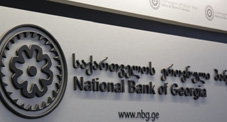National Bank of Georgia publishes money transfers statistics for December
By Nika Gamtsemlidze
Thursday, January 16


95.0% percent of the total money transfers from abroad came from 19 largest partner countries, with the volume of transfers from these countries each exceeding 1 million USD in December 2019. In December 2018, the share of these 19 countries constituted 94.8% percent of the total volume of money transfers.
In December 2019, 25.5 million USD (or 74.1 million GEL) was transferred from Georgia, which is 17.7% more as compared to 21.7 million USD in December 2018.
This time last year, in January 2019, the volume of money transfers from abroad constituted 115.7 million USD (308.4 million GEL), which was 5.1% (5.6 million USD) more than the amount in January 2018.
92.3% percent of the total money transfers from abroad came from 15 largest partner countries, with the volume of transfers from these countries each exceeding 1 million USD in January 2019. In January 2018, the share of these 15 countries constituted 92.0% percent of the total volume of money transfers.
The National Bank of Georgia (NBG) is the central bank of Georgia. Its status is defined by the Constitution of Georgia. The main objective of the National Bank is to ensure price stability.
Georgia's first central bank was established in 1919. In its current form, the National Bank of Georgia has existed since 1991.
According to the Constitution of Georgia, the National Bank is independent in its activities. The members of Georgia’s legislative and executive bodies do not have the right to intervene in the NBG’s activities. The rights and obligations of the National Bank of Georgia as the central bank of the country, the principles of its activity and the guarantee of its independence are defined in the Organic Law of Georgia on the National Bank of Georgia.
The National Bank of Georgia implements monetary policy according to the main directions of the monetary and foreign exchange policy defined by the Parliament of Georgia. It holds, keeps and disposes of the international foreign reserves of the country.
Through its regulation and monetary instruments, the National Bank of Georgia is responsible for ensuring the fulfillment of the basic functions and objectives assigned to it by law.
